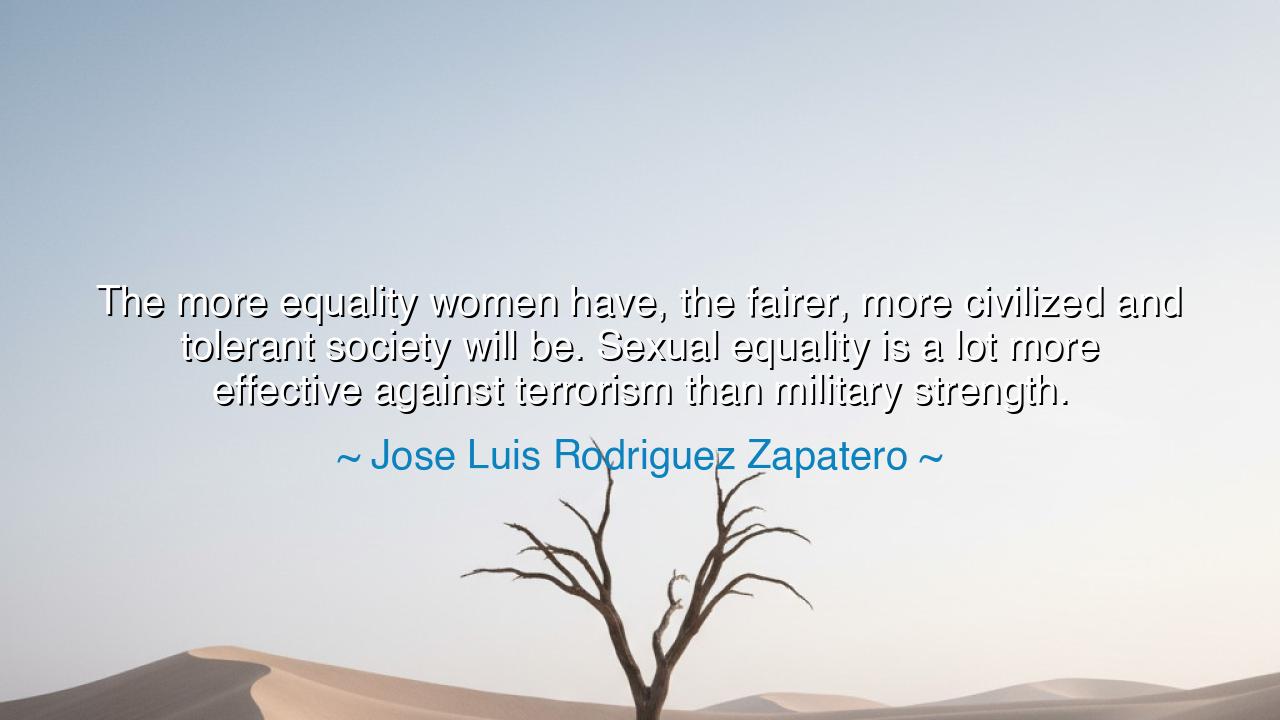
The more equality women have, the fairer, more civilized and
The more equality women have, the fairer, more civilized and tolerant society will be. Sexual equality is a lot more effective against terrorism than military strength.






In the wise and visionary words of José Luis Rodríguez Zapatero, former Prime Minister of Spain, we hear a truth that rings across the ages: “The more equality women have, the fairer, more civilized and tolerant society will be. Sexual equality is a lot more effective against terrorism than military strength.” These words are not merely political—they are prophetic. They call to the conscience of humanity and remind us that true strength does not lie in weapons or armies, but in justice, compassion, and the dignity of all human beings. In his declaration, Zapatero reveals a profound truth: that the freedom and equality of women are not only moral imperatives but the very foundation of peace and civilization itself.
The origin of this quote lies in Zapatero’s time as Spain’s leader in the early 21st century, a period marked by both tragedy and transformation. Following the devastating terrorist attacks in Madrid in 2004, Spain stood at a crossroads between vengeance and renewal. Zapatero, a man of deep conviction, chose the latter path. He believed that the battle against violence and extremism could not be won by force alone—it required a transformation of the human spirit. In his view, gender equality was not merely a social issue, but a weapon of peace—a force capable of dismantling the roots of hatred, ignorance, and oppression that give rise to extremism. Thus, his words became a modern scripture, reminding the world that to build lasting peace, we must first build a just society.
Throughout history, the ancients have known this truth, though they may not have spoken it in the same form. Plato, in his Republic, argued that no city could be truly just until both men and women were given equal opportunity to pursue virtue and wisdom. Confucius, though born in a patriarchal age, taught that the harmony of the household—the balance between husband and wife—was the root of harmony in the state. And the great civilizations that rose in justice—Egypt, Greece, India, and Rome—each reached their highest glory when women were respected and educated, and their greatest decline when that respect was lost. In every age, the progress of civilization can be measured by how it honors its women.
Consider the example of Malala Yousafzai, the young girl from Pakistan who defied the darkness of extremism through the simple, courageous act of learning. When the forces of tyranny sought to silence her voice, she responded not with violence, but with education, with truth, and with the conviction that equality would one day triumph over terror. Her story embodies Zapatero’s teaching: that the pen of a schoolgirl is mightier than the sword of a fanatic. The bullet that struck her did not kill her spirit—it awakened the conscience of the world. And through her, we saw that the empowerment of women is not merely the elevation of one gender—it is the liberation of all humanity.
Zapatero’s insight goes deeper still. He recognizes that terrorism and tyranny grow from the same poisoned soil: fear, ignorance, and inequality. Where women are silenced, societies become rigid; where women are enslaved, minds become closed; and where minds are closed, violence festers. The denial of equality breeds resentment, and resentment becomes hatred. But when women are free—when they can speak, teach, create, and lead—then society itself opens like a flower to the sun. The home becomes a school of kindness; the marketplace, a temple of fairness; and the nation, a sanctuary of peace. For equality is not division—it is balance. It is the restoration of harmony between strength and gentleness, reason and compassion, justice and mercy.
In this, Zapatero speaks not only to his time but to all time. He reminds us that military might, though powerful, can never conquer the human heart. Armies may destroy cities, but they cannot build them; they may end wars, but they cannot prevent them. Only the empowerment of the human spirit, through education and equality, can break the cycle of violence. It is not the sword that civilizes man—it is understanding. It is not conquest that secures peace—it is respect. And the truest test of that respect lies in how a nation treats its women, its mothers, its sisters, its daughters—the bearers of life and the teachers of humanity.
The lesson, then, is eternal and clear: if we wish for peace, we must sow equality. Let every man, in his home and his heart, honor the women beside him as partners, not possessions. Let every government understand that investing in the education and safety of women is the truest form of defense. Let every society that dreams of greatness remember that civilization does not advance through domination, but through balance. When the feminine and masculine are honored equally, then wisdom guides power, and love restrains justice.
So let these words of José Luis Rodríguez Zapatero endure as a beacon to all nations: that sexual equality is not a luxury of peace—it is the creator of peace. The fairer society becomes, the less room there is for hatred. The more civilized a people, the less they depend on arms. And when the world at last learns that every woman’s freedom strengthens the fabric of every man’s destiny, then we shall see the dawn of that age which sages and prophets have long foretold—the age where justice walks with compassion, and peace is no longer a dream, but a way of life.






AAdministratorAdministrator
Welcome, honored guests. Please leave a comment, we will respond soon